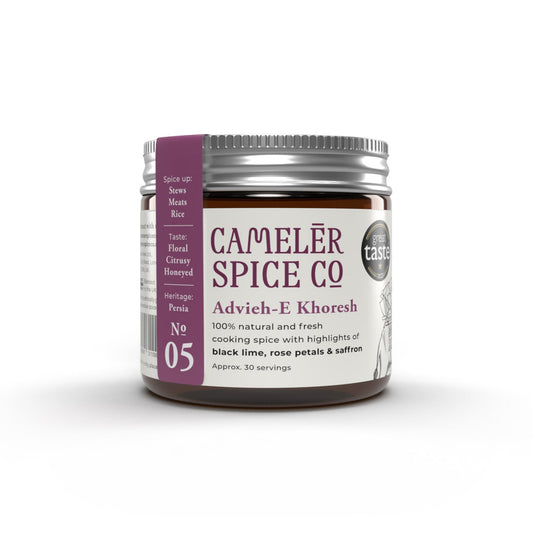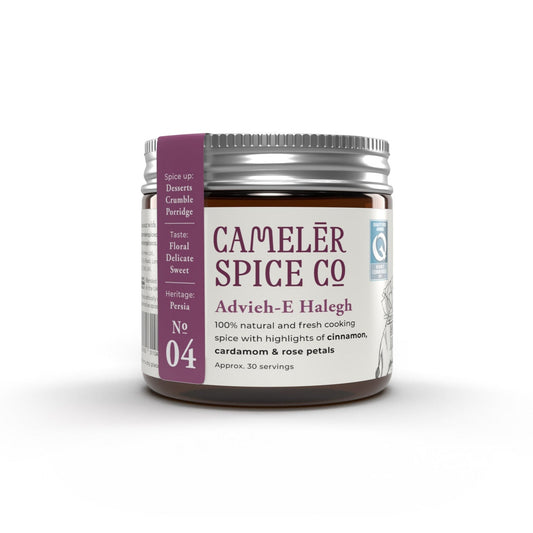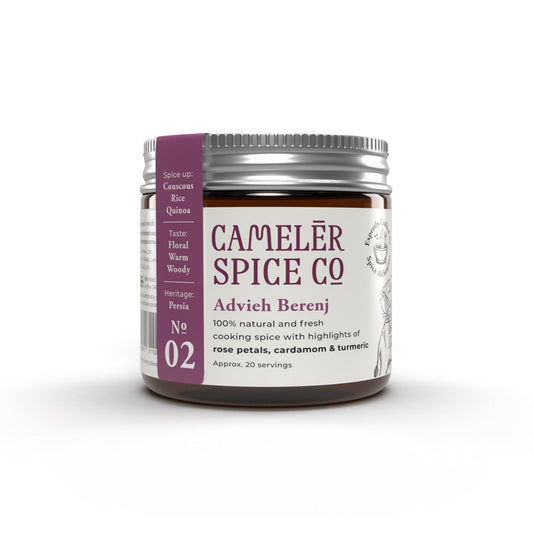
Collection: Rose Petals
(Also Known as Damask Rose or Rosa Rugosa)
What do rose petals taste like?
Rose petals are edible, though certain varieties taste better than others. They can even be eaten fresh and raw. When selecting rose petals, it's essential to be mindful of pesticides and other contaminants.
Floral, musky, and sweet, the Damask rose is the most common rose used in cooking. While roses are likely native to China, the Damask rose is believed to originate from the MENA region. The petals and buds are used in both sweet and savory dishes and serve as decorations for cakes and desserts. Roses produce "rose ketones," which provide green, herby, woody, and berry-like notes.
What flavours go with rose petals?
- Apple
- Almond
- Apricot
- Cardamom
- Coffee
- Chocolate
- Cucumber
- Lemon
- Melon
- Orange
- Saffron
Rose is as integral to Middle Eastern cuisines as salt and pepper are to Western kitchens. In desserts like baklava, rose petals pair beautifully with cardamom and saffron. Our 6th Century BC Persian collection features three blends marrying cardamom and rose petals: Advieh Berenj for savory rice and couscous, Advieh-E Halegh for desserts and baking, and Advieh-E Khoresh for lamb and beef stews, enriched with saffron.
What are the health benefits of rose petals?
Rose petal tea is cherished for its soothing properties, especially for sore throats and its potential to aid liver health. The fiber from rose petals may also alleviate constipation. However, rose petals should not be confused with rosehip, which is notably high in Vitamin C.
What are interesting facts about roses?
- The cultivation of roses began over 5,000 years ago in ancient China, where roses were prized for their beauty, fragrance, and healing properties—a sentiment that remains unchanged today.
- The Romans wore rose crowns to prevent hangovers—a claim more folklore than fact.
- In the 7th Century, Persians pioneered the culinary use of roses by extracting their oils for flavor.
- In Victorian England, rose-petal sandwiches were a popular treat for afternoon tea. They also served as tokens of love: on April 25th (St. Mark's Day), Venetian men gave rosebuds, much like Valentine's Day roses today.
- Taif, in Saudi Arabia’s western region, is renowned for producing the world’s most prized rose oil, used in high-end perfumes. With a richer intensity than the Damask rose, it takes around 40,000 Taif roses to produce just 10g of rose oil.
What is the chief flavour compound of rose?
Geraniol: (floral, sweet, and lingering). Roses contain many other flavor compounds, but geraniol dominates. Complementary spices like ginger and nutmeg enhance rose's flavors. Rose's most effective compounds are oil-soluble, but its potency is best preserved in water-based preparations.
Rose Petals nutritional facts
For a detailed breakdown of the nutritional values of this product, including calorie content, macronutrients, and other key details, please refer to the attached nutritional information sheet. This information is also available on our jars, with allergens highlighted in bold
Shop Spices With Rose Petals
-
Advieh-E Khoresh
Regular price £8.95 GBPRegular priceUnit price / per -
Advieh-E Halegh
Regular price £8.95 GBPRegular priceUnit price / per -
Advieh Berenj
Regular price £8.95 GBPRegular priceUnit price / per






